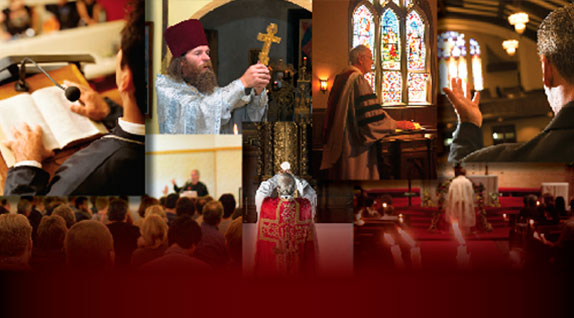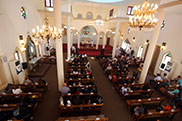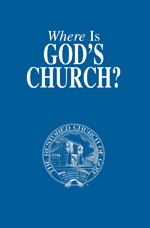 Photo illustration: Jody E. Lydick
Photo illustration: Jody E. Lydick
Article
Billions of professing Christians. Thousands of denominations. Nations impacted across the world. An eye-opening analysis of today’s “Christianity” begs the question: Did Christ mean for it to be this way?
Learn the why behind the headlines.
Subscribe to the Real Truth for FREE news and analysis.
Subscribe NowTraveling on a plane presents opportunities to talk to people you may otherwise never meet. In a sense, plane flights, especially international ones, are cross-sections of the world where strangers from entirely different walks of life can interact.
Some years ago, a trip to Kenya allowed me to have unique discussions with three fellow passengers during my flight.
The first conversation was with a sweet, pious, middle-aged lady who wore a perpetual smile revealing her pleasant disposition. We talked through the entirety of the first leg of the trip.
We learned a lot about each other. She asked what I was going to do in Kenya, and I asked about her travels. I learned she was born in America, but moved to Germany, remained single, and joined a small religious Christian group there. She had taken part in various “missions,” including traveling to Hong Kong to smuggle Bibles into communist China. I thought to myself, This person is dedicated; she believes in her cause.
The second conversation occurred on my flight from Amsterdam to Nairobi. I decided to stretch my legs and walk to the back of the Boeing 747. Near the rear was a small open area where passengers could look out of the window (in this case, at the never-ending, sun-scorched Sahara Desert) and stand for a few moments.
While there, I met an American preacher. He and his wife were planning to go into the heart of Kenya for several weeks. He explained that he had a few hundred people there ready for baptism. This was not his first trip, but it was all part of his mission to, as he put it, “turn hearts to Jesus, glory be to God.”
Again I concluded, Here is another person working at his cause.
Finally, on the way back from Kenya on a flight to Amsterdam, I sat beside a pleasant woman from the state of Wisconsin. She was returning from a mission sponsored by her church. She had been in Goma, a town in eastern Democratic Republic of the Congo, where civil war had ravaged the area and thousands of people were displaced. Being a registered nurse, she spent her time in a medical facility helping doctors mend bullet wounds, treat the sick, work with women and girls who were raped, and much more.
 Christopher Furlong/Getty Images
Christopher Furlong/Getty ImagesAfter showing me some 400 pictures on her digital camera, we discussed our beliefs. She explained that she was reared in a disciplined Christian denomination, but was now in a more contemporary group, which at times made her somewhat doctrinally uncomfortable. Our conversation turned to questions she had about who should preach in church, predestination and baptism. She seemed genuinely interested in hearing my viewpoint on whether she was a converted Christian. She listened intently to any insight I provided. As the discussion came to a close, I again noted, Here is another individual trying to do good and who is concerned about her place in the Christian landscape.
Three very different people. Three very different missions. Three unique sets of beliefs. And these were just three of the almost 2.4 billion people who are considered Christians.
Impacting Our World
Throughout time, there have been people and institutions that have affected the course of the planet: presidents, prime ministers, monarchs, despots, generals, educators, national governments, international coalitions, universities, research centers, religions, etc. The influence of such people and institutions varies widely. A president or prime minister can change the course of his nation. A monarch can represent his or her country in a way that either helps or hurts its image. Institutions can also impact nations and the world at large.
Religions and schools of thought have also had a considerable impact on civilization. Ancient Greek scholars such as Plato and Socrates form the foundation of much of our modern world. Yesterday’s paganism and polytheism is today intertwined in almost every facet of life. Islam has impacted the Middle East for centuries, and is increasingly affecting other regions of the world. Hinduism and Buddhism have also influenced hundreds of millions of lives.
An argument could be made, though, that the religion that has had the greatest impact is traditional Christianity.
Profile of Christianity
The number of professing Christians continues to increase. There are about 41,000 different denominations who all consider themselves followers of Jesus of Nazareth, according to Pew Forum.
Over the past century, Christendom has undergone significant changes. Polls indicate the number of independents and independent groups is rising sharply. Some of the more historic or dominant denominations are becoming less popular.
The Telegraph reported on data from a Pew Research poll that stated, “…more than one third of Americans aged 18 to 29 now say they have ‘no religious affiliation’, compared with less than 10 per cent of their grandparents’ generation.
 Sabah Arar/AFP/Getty Images
Sabah Arar/AFP/Getty Images“While America still remains outwardly far more religious than Europe, the sudden rise of the ‘nones’, as they were dubbed by the Pew Forum on Religion and Public Life, has raised the question of whether the US is on the cusp of a dramatic sea-change in attitude towards religion in public life.”
Evangelicals in America, however, are still considered a force to be reckoned with. U.S. politicians give much consideration to this group because they have a great impact on who is voted into office. Evangelical educational institutions have been created to train young people to become “Christian” lawyers and politicians. They are concerned with the morality of America and will do all they can to fight those in opposition.
Battles are being waged in U.S. courts over how much religion should be involved in governing the people. Morality has been the center of debate for decades.
The Christian world has long tried to evangelize the rest of the world, often by peaceful means; sometimes otherwise. It is reported that hundreds of millions of Bibles are in non-Christian nations. In some regards, Christianity has reached further into remote regions than any other aspect of civilization. For example, in western Kenya, where there are few signs of modern civilization, churches exist, most of them professing to be Christian.
From a purely physical point of view, the impact that Jesus Christ has had upon this world is like none other. Billions who claim to follow Him constitute the biggest segment of society.
Every Shape, Size, Flavor and Color
Today’s Christianity offers something for everyone. There are Catholics, Anglicans, Pentecostals, Presbyterians, Methodists, Lutherans and independents of every sort. There are megachurches filled with people wanting to learn about the “prosperity gospel.” There are ever-popular televangelists proclaiming their message to listeners at home. There are associations and conglomerations of every type.
The concept of participatory theology is becoming more popular. This allows the younger generation to become more involved and create their own type of Christianity. This is especially appealing since many want a voice, and do not want the dos and don’ts of traditional Christianity.
Describing America’s diverse religious landscape in a speech, former U.S. presidential candidate Mitt Romney said, “…in every faith I have come to know, there are features I wish were in my own: I love the profound ceremony of the Catholic Mass, the approachability of God in the prayers of the Evangelicals, the tenderness of spirit among the Pentecostals, the confident independence of the Lutherans…”
He continued, “And so it is for hundreds of millions of our countrymen: we do not insist on a single strain of religion—rather, we welcome our nation’s symphony of faith.”
The question must be asked: Do billions of professing Christians form a symphony of faith—a united, orchestrated, melodic masterpiece? Or is it something else?
In reality, every denomination has its own beliefs and doctrines—everyone disagrees! Is this what the Creator of human beings intended?
Founder’s Point of View
Every professing Christian group and individual believes in some fashion that Jesus Christ is the Son of God, and that He is the founder of Christianity.
What if He came back today and analyzed the 41,000 different Christian groups? Would He be pleased?
Billions claim to follow Jesus, but all have a different understanding of who and what He is—and what He taught. They do not all walk together in the same faith. One website claims that “Jesus is becoming clearer” because there are 175,000 books written about Him. But is this clarity—or confusion?
Every professing Christian, those who claim to be followers of Christ, must ask what Jesus’ reaction would be to today’s Christendom. Would He approve of the disunity? Would He accept every shape, size, flavor and color of belief? Would He accept the confusing message that is sent from the thousands of Christian denominations?
The Word of God declares, “For God is not the author of confusion, but of peace, as in all churches [congregations] of the saints” (I Cor. 14:33).
Jesus also stated, “I will build My Church”—not “churches” (Matt. 16:18), and that His Church was a “little flock” (Luke 12:32).
How does this fit with today’s Christian landscape?
What About You?
Many believe they have committed their lives to Jesus Christ. Those who feel they have done this should ask, “What if Christ came and spoke with me and examined my life? Would He be pleased?”
As an individual, you could dedicate your entire life—over 600,000-plus hours—but still be entirely off track. Do not believe this article; believe Christ’s words: “Not every one that says unto Me, Lord, Lord, shall enter into the kingdom of heaven; but he that does the will of My Father which is in heaven. Many will say to Me in that day, Lord, Lord, have we not prophesied in Your name? And in Your name have cast out devils? And in Your name done many wonderful works?” (Matt. 7:21-22).
Reasonable questions, are they not?
Read the answer and end-result for some: “And then will I profess unto them, I never knew you: depart from Me, you that work iniquity. Therefore whosoever hears these sayings of Mine, and does them, I will liken him unto a wise man, which built his house upon a rock” (vs. 23-24).
Wonderful works are not enough—one must hear Christ’s words—and do them!
The real truth is that professing Christianity is not a symphony of faith—it is a cacophony of beliefs. If one understands the Bible, the instruction manual that Jesus Christ left us, then he understands that God is not the author of this world’s divided Christendom.
Of the vast majority today, Christ said: “Howbeit in vain do they worship Me, teaching for doctrines the commandments of men. For laying aside the commandment of God, you hold the tradition of men…” (Mark 7:7-8). Christianity—whether traditional or contemporary—worships Christ in vain!
Where do you fit in? Could you be worshipping Jesus in vain? Again, do not believe me; believe your Bible. Read our online article series 14 Statements of Jesus Almost No One Believes—and Your Minister Doesn’t Want You to Understand! – Part 1.
You must ask yourself: If Christ sat down with me today, would He say, “I never knew you: depart from Me?” (Matt. 7:23) or “Well done, you good and faithful servant”? (Matt. 25:21).
Tough questions. You owe it to yourself to get plain answers.
Other Related Items:
- 14 Statements of Jesus Almost No One Believes—and Your Minister Doesn’t Want You to Understand! – Part 1
- 14 Statements of Jesus Almost No One Believes—and Your Minister Doesn’t Want You to Understand! – Part 2
- 14 Statements of Jesus Almost No One Believes—and Your Minister Doesn’t Want You to Understand! – Part 3



